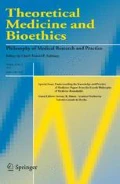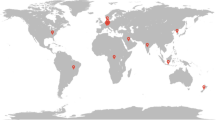Abstract
Empirical studies in bioethics, as well asclinical experience, demonstrate the existenceof inter- and intra-cultural diversity invalues and perspectives on end-of-life issues. This paper argues that while survey researchcan describe such diversity, explaining itrequires ethnographic methodology that allowsordinary people to frame the discussion intheir own terms. This study of attitudestoward euthanasia in Japan found that peopleface conflicts between deeply held values suchas life versus pain, self versus other, andburden versus self-reliance that make itdifficult to rely on a ``rational person''approach to decision-making. An inductiveethnographic approach grounded in people's lifeexperiences can indicate the reasons forvariation in responses to surveys, and canclarify the nature of ethical conflict in aparticular cultural setting.
Similar content being viewed by others
REFERENCES
Marshall PA, Koenig BA, Barnes DM, David AJ. Multiculturalism, bioethics, and end-of-life care: Case narratives of Latino cancer patients. In Monagle JF, Thomasma DC, eds. Health Care Ethics: Critical Issues for the 21st Century. Gaithersburg, MD: Aspen Publishers, 1998, pp. 421–430.
Hern HE, Jr., Koenig BA, Moore LJ, Marshall PA. The difference that culture can make in end-of-life decisionmaking. Cambridge Quarterly of Healthcare Ethics 1998; 7: 27–40.
Marshall PA, Koenig BA. Bioethics in anthropology: Perspectives on culture, medicine, and morality. In Sargent CF, Johnson TM, eds. Handbook of Medical Anthropology: Contemporary Theory and Method. Westport, CT: Greenwood Press, 1996.
Mwaria C. Physician-assisted suicide: An anthropological perspective. Fordham Urban Law Journal 1997; 24: 859–868.
Elliott C. A Philosophical Disease: Bioethics, Culture, and Identity. New York: Routledge, 1999.
Marshall P. Anthropology and bioethics. Medical Anthropological Quarterly 1992; 6: 49–73.
Zussman R. The Contributions of Sociology to Medical Ethics. Hastings Center Report 2000; 30(1): 7–11.
Kleinman A, Fox RC, Brandt AM, eds. Bioethics and beyond. Daedalus (Fall) 1999; 128(4).
Long SO. Living poorly or dying well: Decisions about life support and treatment termination for American and Japanese patients. Journal of Clinical Ethics 2000; 11: 27–41.
Blacksher E. Desperately seeking difference. Cambridge Quarterly of Healthcare Ethics 1998; 7: 11–16.
Long SO. Ancestors, computers, and other mixed messages: Ambiguity and euthanasia in Japan. Cambridge Quarterly for Healthcare Ethics 2001; 10(1): 62–71.
Lock M. Death in technological time: Locating the end of meaningful life. Medical Anthropological Quarterly 1996; 10: 575–600.
Lock M. Twice Dead: Circulation of Body Parts and Remembrance of Persons. Berkeley: University of California Press, 2001.
Tanida N. Japanese attitudes toward euthanasia in hypothetical clinical situations. Eubios Journal of Asian and International Bioethics 1998; 8: 138–141.
Sakamoto and Kitazawa, reported in Asai A, et al. Medical decisions concerning the end of life: A discussion with Japanese physicians. Journal of Medical Ethics 1997; 23: 323–327.
Asai A, et al. Advance directives and other medical decisions concerning the end of life in cancer patients in Japan. European Journal of Cancer 1998; 34(10): 1582–1586.
Takeo K, Satoh K, Minamisawa H, Mitoh T. Health workers' attitudes toward euthanasia in Japan. International Nursing Review 1991; 38(2): 45–48.
Tanida N. Japanese religious organizations' view on terminal care. Eubios Journal of Asian and International Bioethics 2000; 10: 34–37.
Kōseishō (Ministry of Health and Welfare). Makki Iryōo Kangaeru (Thinking about End-of-Life Care). Tokyo: Kōseishō, 1994, pp. 11–15.
Kōseishō (Ministry of Health and Welfare). Makki Iryōo Kangaeru (Thinking about End-of-Life Care). Tokyo: Kōseishō, 1994, pp. 49, 53.
Ito M, Koinuma N. Kin'ishukusei sokusaku kōkashō kanja, kazoku no QOL to anrakushi (Quality of life in the patients with ALS and the family against euthanasia) [abstract]. Nihon Seimei Rinri Gakkai Dai Hachikai Nenji Daikai: Proguramu, Shōrokushŭ (Japan Society for Bioethics 8th Annual Convention, Program and Abstracts). Tokyo: Nihon Seimei Rinri Gakkai, 1996, p. 93.
Keown D. Buddhism and Bioethics. New York: St. Martin's Press, 1995: 172–173.
Ei R. Nidome Daiōjō (The Second Peaceful Death). Tokyo: Iwanami Shoten, 1995, p. 79.
Maruyama TC. Hospice Care and Culture: A Comparison of the Hospice Movement in the West and Japan. Brookfield, VT: Ashgate, 1999, p. 90.
Long SO. Family surrogacy and cancer disclosure in Japan. Journal of Palliative Care 1999; 15(3): 331–342.
Fetters M. The family in medical decision making: Japanese perspectives. The Journal of Clinical Ethics 1998; 9: 132–146.
Asai A, Fukuhara S, Lo B. Attitudes of Japanese and Japanese-American physicians towards life-sustaining treatment. Lancet 1995; 346: 356–359.
Long SO. Shikata ga nai: Resignation, control, and self-identity. In Long SO, ed. Lives in Motion: Composing Circles of Self and Community in Japan. Ithaca: Cornell East Asia Series, 1999, pp. 11–26.
Ohnuki-Tierney E. Illness and Culture in Contemporary Japan. Cambridge: Cambridge University Press, 1984.
Author information
Authors and Affiliations
Rights and permissions
About this article
Cite this article
Long, S.O. Life is More than a Survey: Understanding Attitudes toward Euthanasia in Japan. Theor Med Bioeth 23, 305–319 (2002). https://doi.org/10.1023/A:1021243805657
Issue Date:
DOI: https://doi.org/10.1023/A:1021243805657




